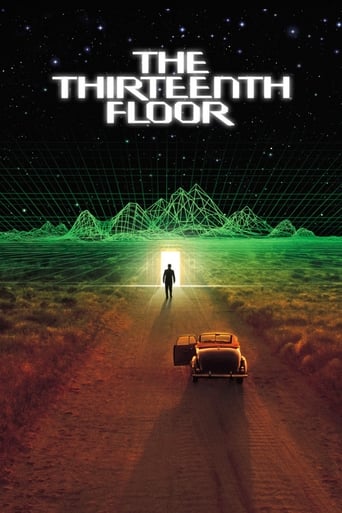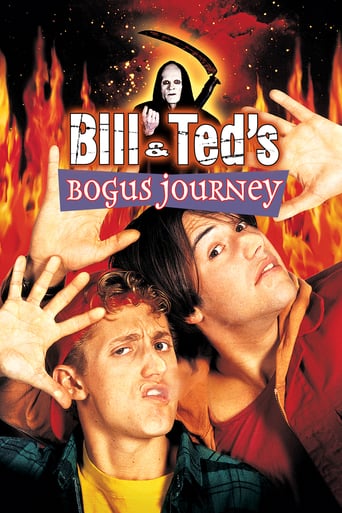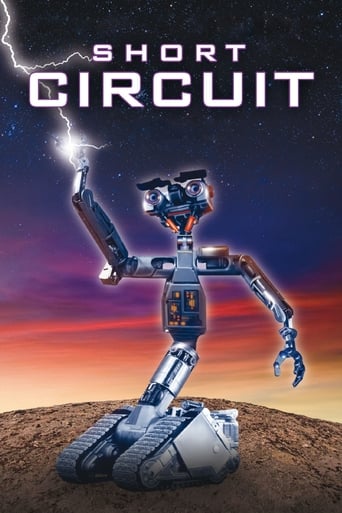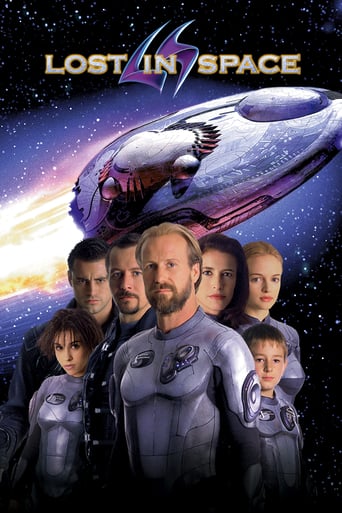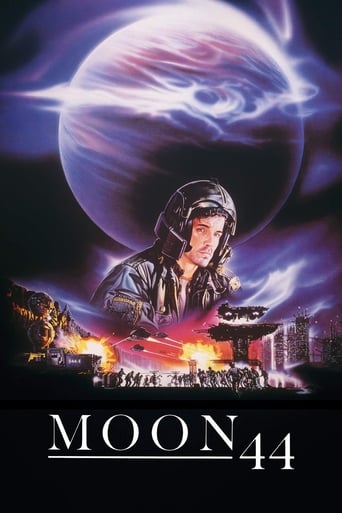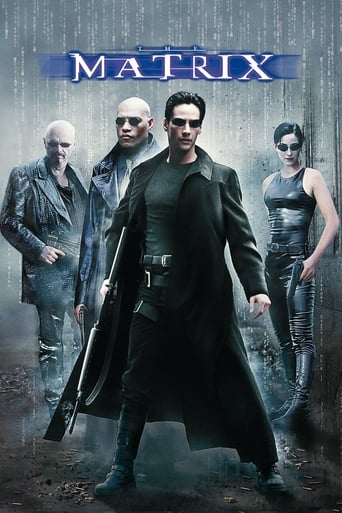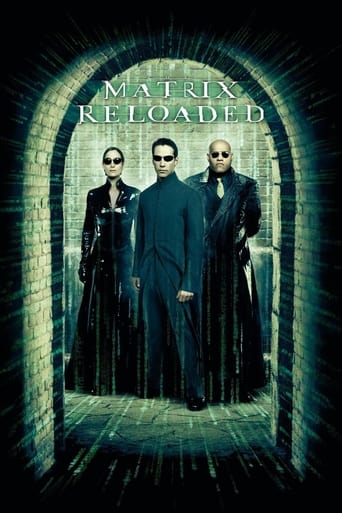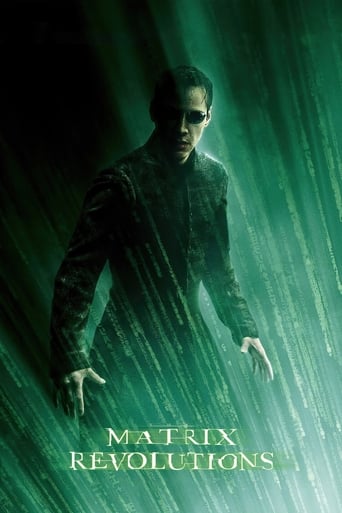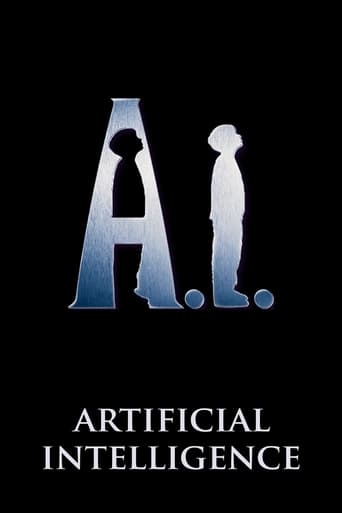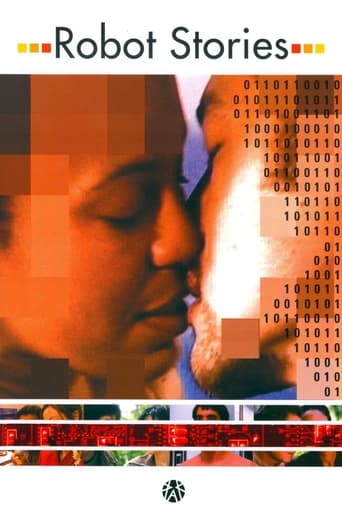
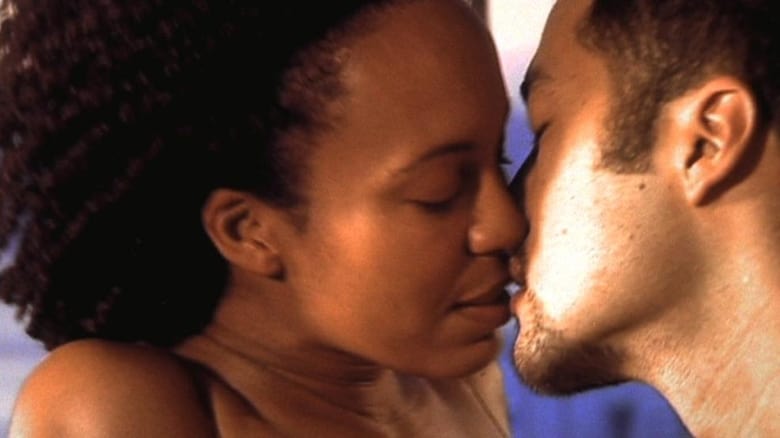
Robot Stories (2003)
Four stories including: "My Robot Baby," in which a couple must care for a robot baby before adopting a human child; "The Robot Fixer," in which a mother tries to connect with her dying son; "Machine Love," in which an office worker android learns that he, too, needs love; and "Clay," in which an old sculptor must choose between natural death and digital immortality.
Watch Trailer
Cast


Similar titles
Reviews
How sad is this?
Although I seem to have had higher expectations than I thought, the movie is super entertaining.
The film never slows down or bores, plunging from one harrowing sequence to the next.
The thing I enjoyed most about the film is the fact that it doesn't shy away from being a super-sized-cliche;
Robot Stories, created in 2003 by Greg Pak is his first (and so far his only) feature film. It consists of four independent vignettes, each one treating another aspect of our relations with the world of robots. A couple who wants to adopt a child gets a robot-baby instead, just for exercising. A mother tries to connect to his comatose son by sharing his passion: fixing robot-toys. A robot-worker gets in love with a female-robot. An old sculptor who will die soon has the option to become a robot and live for ever in a hologram.The movie got very controversial reviews. Some compared Robot Stories with other movies of the same kind to find out that everything that was to be said about robot stuff had already been said. Some others tried to consider the movie on its own merits. I think it should be considered also within the context of Greg Pak's creation, all his comics and very short movies (videos of less than 10 minutes, even less than 2 minutes): it is about the interactions between our universe and the universe of his comics.Robots were created with the aim to help us: in our work, or in our moments of fatigue, when we need some kind of intelligent toys to play with. Only it happened that robots went further and created their own universe, sometimes controlled by us, sometimes with them in control, sometimes cooperating with us, sometimes competing. Contacts between our universe and theirs can be sometimes beneficial for both, while many times it is about collisions with unpredictable outcomes. On the other hand, in most cases the universe of robots offers a window for us, to look into it: what happens there, in their world, is the objective image of what we are.If we consider now the four vignettes of the movie, we could say that the vision of Greg Pak about the matter is rather pessimistic. Babies are replaced by robots, communication between humans is possible only using robots, human sentiments are felt by robots only (and humans forgot about them), medicines cannot compete viruses any more while death sends human beings into the world of robots for ever. Is the picture too pessimistic? Well, let's put it this way: babies start being little savage robots till we learn how to communicate with them, communication between humans is ultimately possible, even if we need robots for that, and so on. Discussing this movie we can go either way. Plus think about that: the movie uses robots to describe our own world. Is it about them or about us? As I said, we can go either way.The first vignette (My Robot Baby) is funny and witty. What are babies after all, other than little savage and absurd things you cannot communicate with? Anything you try, they keep on crying. And only when you don't know what to try anymore and get discouraged, they start understanding you. The communication channel is set when the little thing realizes you can be weak, too.The second vignette (The Robot Fixer) is a little gem. Mother and daughter come at the bed of their son and brother: he lies in a coma, brain-dead, and the only decision to take is when to unplug him. The daughter realizes it very well, while the mother is thinking how to connect with the son in his last days. A set of little robot toys discovered in his little condo shows her that she knew the son very little. And the mother starts to learn about robots, to play with them, to fix the toys, to be at least now in synch with the boy. Is it too late? Is it useless? Maybe any human attempt is useless or it comes to late, but it doesn't matter. It has to be done.The third vignette (Machine Love) is funny, but rather weak, in my opinion. An android worker (nicely played by Greg Pak) is surrounded at office by humans devoid of any warmth, while he discovers, step by step, the miracle of love. I saw better ones, even between robots. The standard was probably set by Data, what do you think? As for the last vignette (Clay), it has a great subject, maybe difficult to be grasped. To continue your life for ever, frozen in a hologram, or to accept the dignity of your never more? Well, when you tackle with a great subject, you should have a moment of genius, to say there the ultimate truth. I think the moment of genius came for Greg Pak in the second vignette. But all in all, you shouldn't miss these four Robot Stories. They are uneven, that is true, but Greg Pak is a very cool creator.
I recently picked this up as a rental and was glad I did. Like many other people who've commented here, the overall film is a bit uneven. However, the first two films make it really worth it.In the first film, "Robot Babby," I believe Tamlyn Tomita's performance, really helps sell this story. Her reaction at the end is the key to the entire film.The second story, "The Robot Fixer," is really great. You could pull this story out and show it alone as an example of what can be done with a little money and not a lot of time. With even the simplest movies today moving into 2+ hour length, it's refreshing and somewhat inspirational to see something this good come out in a short. This one will stick with me. Excellent performances, particularly by Wai Ching Ho as the desperate mother.The final two films, "Robot Love" and "Clay," don't quite have the power of the first two. "Clay" has an interesting premise (place a scan of your brain in some Matrix-like system and have eternal life). However, the script struggles with clearly developing the internal dilemma of the main character. He's trying to wrestle with the issue of whether such a future consists of a real life. A pretty good try though.Overall, if you want to try something a little different from the norm, this is a very good change of pace. I will keep an eye out for future work from Greg Pak.
All things considered it was terrible. It would have been novel about 10 years ago, but now all the ideas have been explored much better by cinema and other media as well. The stories are too unsophisticated and do not go beyond "feel goodness". I am sure that artsy people who do not follow scientific and technological developments much and who are not really into sci-fi, may be pleasantly surprised and challenged by the ideas in these 4 stories, but for anyone, who have thought about these issues 10 years ago and have since moved on, these stories do not offer anything other than cheesy effects and lame acting.The first story has an interesting premise - a couple has to adopt a baby robot for a month as a test for their ability to adopt a human baby, but it really doesn't add anything to what was already covered in depth in Spielberg's A.I. and it also looks sh1t compared to an A-movie sci-fi such as A.I.The second story isn't really a science fiction film at all and is virtually content-free. The main idea is that it's sucks when your son lies brain-dead in a coma and you need to give doctors a permission to pull out the plug. Well, yes, indeed it sucks, but in what unique way does the story explore this problem? The third story is funny and even nice in some ways. It has some semi-interesting ideas about the future, but the overall message is pathetic - robots need some love too. Once again, there is nothing that wasn't said in, say, Bicentennial Man. And once again, the effects are non-existent and there is no depth.The fourth story is the most ambitious of all, and it probably fails less dramatically than others. But it still fails. May be the director had some deep message that he wanted to put there, but he probably forgot. Again, there isn't much in terms of original ideas - deathism, senile dementia and irrational stupidity. May be the viewers are expected to feel empathy with that old loser, I don't know... But I certainly didn't.Overall these films are probably worthless to a sci-fi fan. However, to a casual viewer, who lived in a cage for the last decade and was not exposed to even the simplest ideas about the future through Internet or magazines such as Wired, SciAm, Pop. Mech. etc., would probably enjoy these (especially if he's into independent Asian films). There is also some hope for Greg Pak, seeing as he is in the very beginning of his directing career. Hopefully, he will tackle these ideas better in the future. And it's also nice to see such interest to sci-fi themes among the juries.
Beautifully shot and very moving.I found all four stories very strong and riveting. Great performances throughout in particular Sab Shimono's portrayal of the old man. Each chapter left us with a bittersweet moved and inspired kind of feeling.Don't go looking for regular science fiction here. This is a good art film. The robots don't kill anyone, for the most part do their utmost to fit in. They are metaphors and mirrors that Greg Pak uses to reflect back into our very souls.





